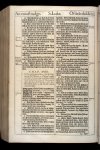Nehemiah, Gordon Fee is one of the top Bible translators in the world.
Qualifications Beyond Comparison, Will You Dare Review The Link?
Just One Man Of 60 That Translated The 1611 Authorized King James Version
LANCELOT ANDREWES
Personal and Family Life
Lancelot Andrewes was born in 1555 in the London parish of All Hallows, Barking, by the Tower of London. He was one of twelve children born to Thomas and Joan Andrewes. Thomas was a mariner from Hordon on the Hill, Essex. Through their industry Thomas and Joan were able to accumulate a sizeable estate. Grateful for his parentage, Lancelot on one occasion expressed thanks he was "not the sad egg of sorry crows".
Lancelot was the oldest child of his family, born when his parents may not have had the prosperity they later enjoyed. As a boy of eight he enrolled at the Coopers' Free School which has been described as a charity school maintained by the Cooper's Guild for "poore mens children". The schoolmaster was Thomas Ward, who played a pivotal role in young Lancelot's life. Thomas Ward recognized in his young charge great scholarly promise. He is credited with persuading Lancelot's parents to continue his schooling rather than apprentice him to a trade. Thomas and Joan Andrewes' decision proved decisive to Lancelot and to the world. Among Andrewes' prominent character traits were gratitude and generosity. He never forgot what Thomas Ward did for him, and played a decisive role in the life of Ward's son, Robert, who like Lancelot, became one of the Translators of the King James Bible (hereinafter KJB), (see Robert Ward biography).
When Andrewes was about ten years old, he entered Merchant Taylors' School, London. The headmaster of the school was Richard Mulcaster (see Bio Bits) who became one of the most noted educators of his time. He, like Ward, was a major influence in Lancelot Andrewes' life. Mulcaster introduced his students not only to the classical languages of Latin and Greek, but to Hebrew as well. He took special pains to expose his students to music, drama and oratory. Mulcaster's curriculum proved invaluable to Andrewes.
As a young student Lancelot was intense. A contemporary biographer said:
From his tender years he was totally addicted to the study of letters. Andrewes studied so hard that his parents had to force play upon him. He never loved or used any games of ordinary recreation, either within doors as cards, dice, table chess, or abroad as bats, quoits, bowls or any such, but his ordinary exercise and recreation was walking, alone by himself or with some other selected companion, with whom he might confer or argue and recount their studies.
Fellow students of Lancelot at Merchant Taylors' included the great poet, Edmund Spenser as well as five future Translators. Spenser was one with whom he walked and talked.
Andrewes held his schoolmaster, Richard Mulcaster, in such high regard that in later years he placed Mulcaster's picture over the door of his study in tribute, and for continuing inspiration. Andrewes even remembered Mulcaster's son, Peter, in his will.
At age sixteen he began his university studies, having been awarded a scholarship to Pembroke College, Cambridge funded by Thomas Watts, archdeacon of Middlesex. Pembroke, though a thoroughly Protestant college, was less Puritanical than others. His friend Edmund Spenser also chose Pembroke. While at the university, Lancelot demonstrated the same scholarly rigor that marked his work at Merchant Taylors'. He continued to avoid games and recreation other than walking. He stayed at the college year round until he graduated B.A. Thereafter, as he pursued advanced degrees he traveled home once a year, walking each way.
Even while on vacation at home he pursued his studies, engaging his father to seek out a teacher to tutor him in a language he had not yet acquired. This may account for how he mastered at least fifteen languages during his lifetime. As he worked towards his B.D. he learned Arabic, Aramaic (Chaldee) and Syriac.
Career
Lancelot Andrewes, like many of the Translators, led a career both at the university and in the church. His first academic office was as a fellow of Pembroke College. This was followed by his appointment as college catechist. As catechist he delivered lectures to the university and Cambridge community on the Ten Commandments.
He was ordained a deacon and priest on the same day, 11 Jun 1580, by William Chaderton, Bishop of Chester. The next year he was appointed treasurer of Pembroke. In 1586 Andrewes was appointed chaplain to the Earl of Huntingdon.
1


